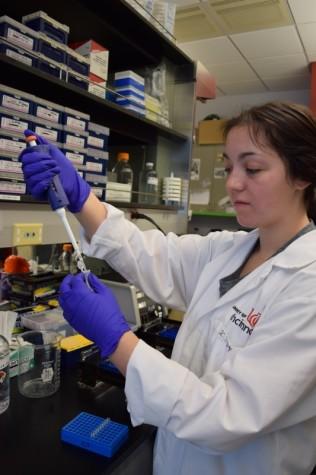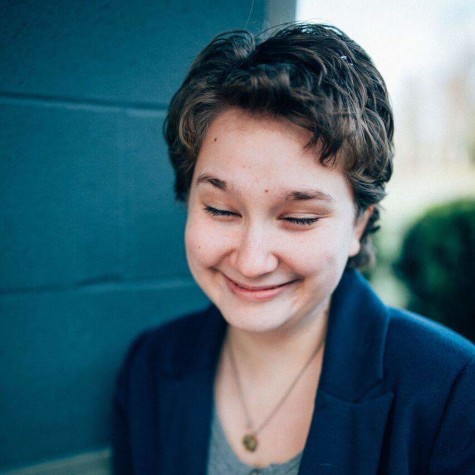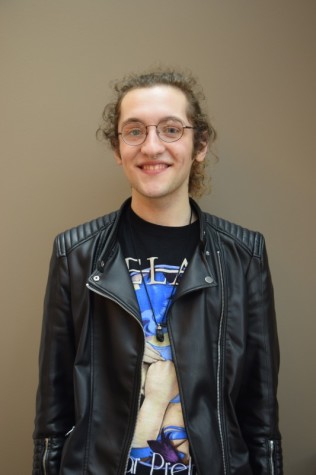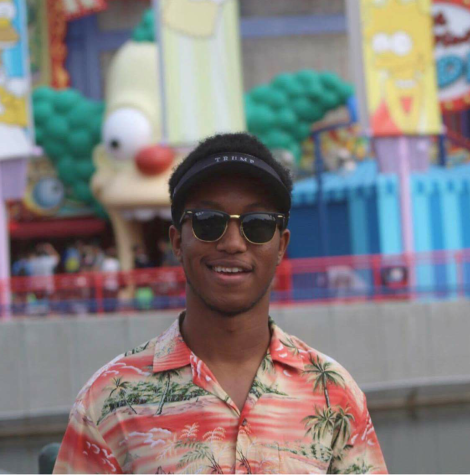Voices of feminism: All are welcome.
April 29, 2016
A person may walk into a convenience store and purchase a nude Band-Aid without having to question why the shade “nude” doesn’t match their skin.
Others can take a stroll down the street without being plagued by the uneasiness of an unwanted catcalled.
These privileges and more, although often unrecognized, are often afforded to those who are white and male.
This concept, which is referred to as intersectionality, has come to the forefront of the third wave of feminism.
Intersectionality takes into account not only the equality of women with men, but the equality of women of color, LGBTQ women, those who identify under the non-binary umbrella and other minorities.
For Dr. Mary Bucklin, co-director of the Women’s and Gender Studies Program at NKU, there is still persistent work to be done for the fight for equality.
“We’re trying to fight the stereotype. We’re trying to break through the stereotype and say ‘Hey, we can do this,’” Bucklin said. “There’s this idea of the glass ceiling where women can’t break through the top, well now we’re figuring out that we’re breaking through the top but it takes us longer and there’s so much more to do. We need the mentors.”
The Women Gender Studies Program aims to dispel stereotypes that exist between the male and female genders as well as gender identities in the non-binary and transgender identities.
Non-binary is a term that describes those who don’t fit into the gender binary, which classifies people into two genders. Transgender denotes a person whose gender identity does not correspond with the gender they were assigned at birth.
“Historically what was understood as masculine and feminine was the understanding that women were less than and that we weren’t smart enough. Blood flow to the brain was taking away blood flow from the uterus and therefore affecting baby-having and mothering; it was this absurd science,” Meredith Smith, co-director of the Women’s and Gender Studies Program said. “That absurd science started this concept, then we added to that notion that women are less than.”
With gender studies courses serving as gen-eds, college students often find themselves face to face with these issues of gender stereotypes as they enter college, as well as ideas of feminism. Below are collected perspectives from students across campus regarding these issues.
Kelsey Klinefelter
Despite feeling as if women are not as represented in the workforce in terms of STEM (science, technology, engineering, and mathematics) fields, junior biological major Kelsey Klinefelter ultimately feels as if NKU has surrounded her with a positive and hopeful environment.

Kelsey Klinefelter is a biology major. Despite feeling as if STEM fields can be dominated by men, she finds power in female role models.
Klinefelter noted that within her classes at NKU, she feels as if there are more women than what she sees in the field. She believes there is a greater push for her generation of women to pursue STEM careers.
Klinefelter looks to her own professor, Dr. Christine Curran, whom she researches gene expression with, as a female role model when it comes to both the biological sciences major, as well as chemistry and criminology minor, and her own career path.
Klinefelter uses stereotypes surrounding her and defies them. When she sees that more men are in her field she works towards her goals even more.
“It has the opposite effect. It motivates me,” Klinefelter said. “I want to do well and I want to show that I can excel and succeed in this type of field of study.”
Though women are more represented in STEM careers then they were in the past, women still remain underrepresented in the workforce, according to the National Girls Collaborative Project.
In 2014, 39 percent of chemists were women, 12.1 percent of civil engineers were women, 27.9 percent environmental scientist were women and 7.2 percent of women were mechanical engineers.
“You have to be less emotional, more successful, more motivated and maybe even longer hours just to prove yourself that you’re just as smart,” Klinefelter said.
Alena Firlie

Alena Firlie was aware of gender stereotypes from a young age. Through activism and education, she believes that people can be empowered to push past these stereotypes.
Alena Firlie didn’t become aware of gender stereotypes until she entered school, where things traditionally seen as feminine for young girls were pushed on her.
She never quite bought into the stereotypes around her; donning a bowl cut from a young age and not wanting to wear to dresses or skirts. She always felt as if she didn’t fit in as a result.
“Now that I think about it, I lost a few friends because people get antsy being around someone who doesn’t quite fit in, which is probably why I tend to attract people who don’t fit in,” Firlie said. “People tried to put lipstick on me and stuff and I was like ‘this is fun, but totally not my thing!’”
Currently a freshman theatre major, Firlie is considering double majoring in Physics. Firlie said that she has never catered to gender stereotypes or let those stereotypes hold her back from being who she wants to be.
Firlie is part of S.W.E.R.V.E as well as current vice president of the Feminist Alliance , a fairly new organization at NKU.
Despite the organization still finding its feet, Firlie believes that there’s a lot of potential in the Northern Kentucky region.
“I wanted to outreach with younger people and bridge that gap between high school and college students as well as younger people,” Firlie said. “Everyone should learn and grow and figure out how to respect women. That’s a thing that has to change.”
Being able to educate children from a young age regarding issues of gender would help dispel current stereotypes as well as empower kids to push through them, according to Firlie. She remembers stereotypes pushed on herself as young as kindergarten.
In every major and career path, according to Firlie, women will face limitations, but one must keep in mind that these limitations can be surpassed.
“People don’t tell you how tough it is, but for the most part I have to remind myself that it’s not true. A lot of the crap that comes flying at me is not about me, it’s about other people and about what they want to see and what they do see as well as the disparities that come from it,” Firlie said. “It’s not about the limitations or gender, it’s about you and what you can do. If you push that boundary far enough someone will let you do it.”
When considering double majoring in physics, it was a woman who won a mathematics award that inspired her.
Maryam Mirzakhani, who was born and raised in Iran, was the first woman in its 80 years to win the Fields Medal in 2014, which is seen as the equivalent of the Nobel Prize for mathematics.
Firlie also cited Marie Curie, the first woman to win the Nobel Prize and Einstein’s Wife, Mileva Maric as women who historically pushed back against limitations imposed on them.
It’s women who have pushed past stereotypes who encourage Firlie to do the same, and she hopes other women will follow suit.
Kevin Gabbard

Kevin Gabbard is on eboard for Common Ground. Gabbard believes that intersectional feminism can give a voice to those who whould otherwise be overlooked.
Kevin Gabbard never felt comfortable with being classified as either a woman or a man from a young age.
Gabbard identifies as agender, a term used to describe someone who doesn’t identify as either gender, but rather sees themselves as gender neutral or genderless.
They recall their elementary classroom being divided into girls and boys. Gabbard always thought that the reason this themselves, was because the majority of their friends were girls. That’s who Gabbard wanted to be with, but later Gabbard realized this discomfort stemmed from not identifying with either classification.
“All my life I was uncomfortable with the classification of ‘Boys on this side and girls on this side’ and things like that,” Gabbard said. “I had always had a problem with that and I didn’t know why.”
Gabbard serves on the eboard for common ground and is a junior international studies major.
Common Ground serves to provide a safe place for its members, both those who identify under LBGTQ+ as well as allies, while educating the public about the LBGTQ+ community.
Gabbard was able to put a term to his identity after coming to college, where they began to learn more about gender identities through sites like Tumblr. Through growing into their identity, they were also able to grow as an individual.
Within Common Ground events, such as the drag show and open discussions, people are educated about alternative genders as well as dispelling gender stereotypes.
Much of the hatred that comes from people towards those who identify as non-binary, according to Gabbard, stems from a place of ignorance which in turn creates intolerance.
“People tend to misunderstand that I’m happy not being any gender at all. I’m agender and they have trouble understanding that I’m not either,” Gabbard said. “There’s always a focus on if I’m going to transition, and there’s really nowhere for me to transition.”
Intersectional feminism, according to Gabbard, gives a voice to minority groups as well as recognizes the privilege that some groups, such as white cisgender people, have.
Cisgender refers to a person whose identity and gender is the same as the sex assigned to them when they were born.
In relation, transgender refers to a person whose identity and gender is different from what was assigned to them at birth.
“There’s not enough discussion on intersectionality in general, even if we’re not talking about people of different genders. People aren’t even taking in consideration people of color,” Gabbard said. “How can you can ignore that part of someone’s identity? Just because we’re white and don’t have to think about our identity doesn’t mean that they’re aren’t still people struggling.”
Though they acknowledge that there is still work to be done, Gabbard is excited to see inclusive initiatives on campus such as inclusive bathrooms and changing rooms in the rec center.
That being said, Gabbard still finds that transgender people and others in the non-binary, there is still work to be done both to protect these groups not only on the local level, but nationally as well.
“With trans people who identify as male or female there are definitely some changes being made but there are still multiple states who don’t even have laws protecting those groups,” Gabbard said, using workplace dress code as an example.
Currently 22 states have some level of laws for the protection for transgender people against discrimination, according to the National Center for Trans Equality.
Kentucky is not one of the states protecting the transgender and non-binary community through laws.
“[Intersectionality] can benefit everyone. White cisgender men are going to have to take a back seat for awhile, but I don’t think that that’s going to be so detrimental to them,” Gabbard said. “Meanwhile we can bring everyone else up to an equal position.”
Sami Kolleh Dada

Sami Kolleh Dada compared the feminist movement to LGBTQ movements. For the movement to go on, he said, allies are essential.
When first coming to America, Sami Kolleh Dada had to educate himself on the downfalls of the stereotypes he held, resulting from a difference in cultural backgrounds.
“I know that everybody, no matter how hard they try all have stereotypes. I know me, being African, I grew up where my mom was in the kitchen, my mom cleaned, my mom cooked,” Dada said. “When I got to high school and college, and went to other people’s homes and I’d see their dad cooking or see that their mom doesn’t know how to cook.”
To debunk his own stereotypes Dada tried to go into situations with an open mind. Education, according to Dada, gives one the ability to push back against commonly held stereotypes.
Currently a double major in organizational leadership and communication, Dada is involved in an array of organizations on campus including Student Government Association, NKU R.O.C.K.S, African Student Union, the National Association for the Advancement of Colored People, Activities Programming Board, Pi Kappa Alpha and Pike.
Although movements such as feminism and black lives matter may not necessarily cross paths, the overlap of social movements exists. According to Dada, social movements can help each other’s causes if they try to understand one another.
“They can help each other, but both parties have to understand and see the similarities but also understand the differences,” Dada said. “Once they both come to that general conclusion they can help each other.”
Comparing the feminism movement to the LBGTQ rights, Dada said the movement wouldn’t have advanced without the help and support of allies. In the same way, feminism can’t progress without including men in the picture.
“Even with the men who have those stereotypes, get them into conversation and get their viewpoint. Tell them ‘I understand your viewpoint, but this is how we see it,’” Dada said. “Try to get them to see it the way you see it and once you do that, and once it clicks, you’re good.”
As the movement of feminism progresses it’s important to keep in mind that there’s still a long way to go in terms of equality and treating women, as well as all genders, with equality, according to Bucklin who cited the female provost and the several female deans as progress compared to what it was before.
“One of the scariest things about understanding privilege and understanding stereotypes is that once you become empowered with this information and crack the door open and begin to explore your own problems with all of these things it really does mean that you have to do something,” Meyers said. “You have to get out there and try to break down those stereotypes and try to help other people understand their privilege as well as help the others behind you.”
Smith noted that the Women and Gender Studies program, which students can connect with on Facebook as well as on NKU’s site through http://artscience.nku.edu/departments/hisgeo/wgstudies.html, allow professors to learn alongside their students.
“There is space for all identities and we are learning and growing,” Smith said. “All are welcome.”
Editor’s note: A section of the original piece was retracted since the publishing date by request.

